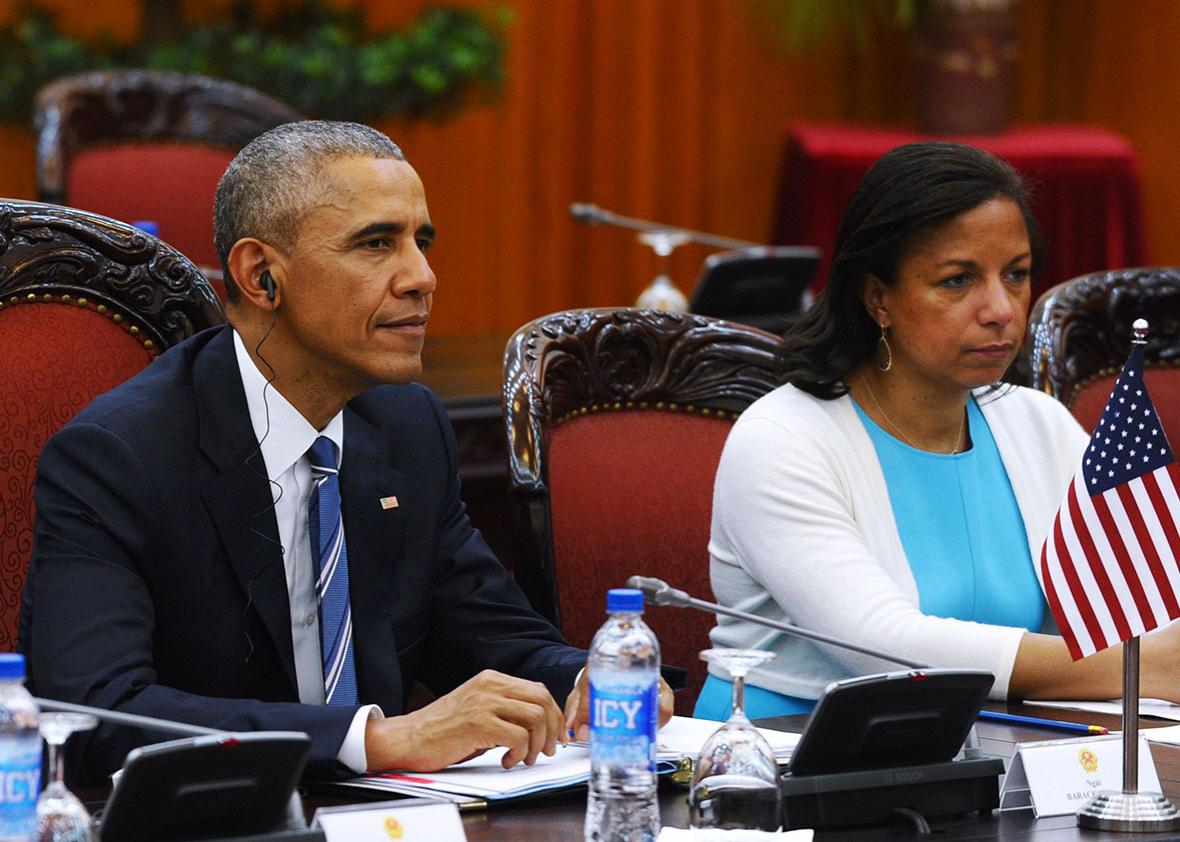I visited Vietnam 11 years ago, and the deepest impression I took away was that the war had long been over, much more so for the Vietnamese people than for us. Except for a few tourist sites, there were no signs that there had ever been a war there, much less one that ravaged the country and killed at least 2 million of its people. It seemed all anyone wanted to do—as much in Hanoi as in Ho Chi Minh City (formerly Saigon)—was to hustle and join the world economy. A local journalist who had been a North Vietnamese spokesman during the war even urged me to tell my readers that Nike sweatshops were good for his country by providing more and better jobs than most local industries.
All of which is to say that President Obama’s trip to Vietnam—including his lifting of the U.S. lethal-arms embargo and his announcement of commercial deals totaling $16 billion in sales by Boeing and Pratt & Whitney—is long overdue.
Obama’s two-day visit, to be followed by another two days in Japan, isn’t just about putting an end to the Vietnam War and its long, painful aftermath—a process started 20 years ago by John Kerry and John McCain, then both senators and bitter veterans of the war. The trip is also about advancing the Asia-Pacific “pivot”—the idea of shifting the focus of foreign policy away from the stagnant battles of the Middle East, more toward the dynamic promise of the Asia-Pacific—which Obama has wanted to pursue since the onset of his presidency but which the old world’s ceaseless crises have thwarted.
And, of course, it’s also about containing Chinese aggression in the South China Sea (which is one element of the pivot as well). Obama claimed otherwise at a joint appearance with Vietnamese President Tran Dai Quang on Monday, saying that the decision to lift the arms embargo “was not based on China or any other considerations” beyond the completion of “normalization with Vietnam.” But it’s well-known that Vietnam’s leaders have been pleading for lethal weapons from Washington since 2014, when China set up an oil rig in waters near the Paracel Islands, which Vietnam claims. Since about the same time, American emissaries have been pushing for full port rights at Cam Ranh Bay, the former Soviet naval base on Vietnam’s central coast, whose deep waters can support the largest U.S. warships.
Human-rights groups denounced the lifting of the lethal-weapons embargo, noting that several administrations, including Obama’s, have said the move would take place only after Hanoi improved its human-rights record. Removing the ban, despite the continued jailing of peaceful dissidents, only encourages the Communist government to continue its oppressive practices.
Obama will reportedly address this issue in a speech on Tuesday to young people in Ho Chi Minh City. Meanwhile, he said that, even after lifting, U.S. officials would review specific requests for weapons on a “case-by-case” basis, assessing “what’s appropriate and what’s not,” as they do with requests by other recipients of arms—and that human rights would be one factor in this review. What’s ending, he said, “is a ban that is based on an ideological division between our two sides.”
That is the main point of what Obama is doing in Vietnam, just as he has previously done in Myanmar, Iran, and Cuba—not to open relations for their own sake (he sees no point doing so in North Korea, for example), but to do so if opportunities present themselves and if the only impediment is the dead boot of forgotten history.
Daniel Sneider, associate director of Stanford University’s Shorenstein Asia-Pacific Research Center, has visited Vietnam, and talked with officials there, several times since 1980. “They were clear back then that they were looking to engage the U.S. for strategic balance against their Chinese enemies, but the U.S. was not yet able to rid itself of the view of Hanoi shaped by the Vietnam War,” he recalls. Once President Bill Clinton did open up relations after the Kerry–McCain visits, trade and investment took off—and continues to rocket today.
“There is no question of both the strategic logic of our partnership with Vietnam and the impact of liberalization as an engine of social and economic change in the country,” Sneider says. “It is a process, and the Vietnamese Communist Party is no more eager to give up its monopoly of power than the Chinese—though there is far more political change in Vietnam than in China.”
In the 1970s, in the wake of the Vietnam War and revelations of malfeasance in U.S. intelligence agencies, Congress enacted reforms barring arms sales to countries with abhorrent human-rights records. However, these laws allowed waivers if the president certified a sale as vital to national security. Over time, these waivers became commonplace to the point where the laws became meaningless. During economic downturns, even critics of arms sales started seeing them as tempting sources of export revenue. After the attacks on Sept. 11, 2001, they also regained favor, reminiscent of Cold War times, as tools for strengthening allies and boosting American influence.
With the United States selling caches of weapons worth hundreds of millions (in some cases, billions) of dollars to Saudi Arabia, Egypt, Turkey, Pakistan, Kazakhstan, and Azerbaijan, it doesn’t make much sense to deny a place on the list to Vietnam—whose record is no worse and, compared to some, much better. And given Vietnam’s genuine need for certain weapons (especially for maritime defense), the mutual interest a relationship holds for the U.S. Navy, and the intense level and pace of foreign investment in Vietnam over the last two decades, the idea of continuing the embargo seems shortsighted and arbitrary, at best.
